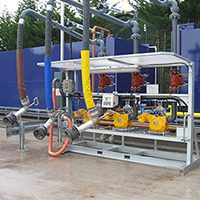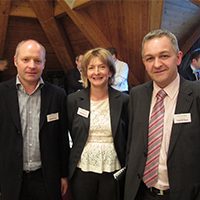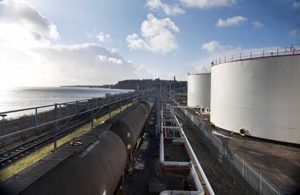For many years, BP, with a certain amount of supporting fanfare, has produced an annual Energy Outlook, which takes a forward looking view of future energy supply and demand, accompanied by a welter of statistics and tables. The latest publication, released in January 2013, comprised projections through to 2030.
In March, with rather less fanfare but of comparable authority, substance and weight (131 pages), Exxon Mobil updated its annual review in a publication entitled Outlook for Energy: a View to 2040. Given its size and scale/spread as a supplier and presence in the global energy market, its key findings are worth capturing.
Oil will remain the number one global fuel
What are the key findings of this ‘window to the future?’
Oil will remain the number one global fuel. Natural gas will be the fastest growing major fuel with demand rising by 65%, overtaking coal for the number two spot. World oil demand, excluding biofuels, will rise to 105 million barrels per day by 2040 (88m bpd in 2012).
Efficiency will continue to play a key role in solving energy challenges. Energy-saving practices and technologies, such as hybrid vehicles and high-efficiency natural gas power plants, will help countries in the Organisation for Economic Cooperation and Development (OECD), including those in North America and Europe, keep energy use essentially flat, even as OECD economic output grows 80%.
Energy demand in developing nations (non OECD) will rise 65% by 2040 compared to 2010, reflecting growing prosperity and expanding economies. Overall, global energy demand will grow by 35%, even with significant efficiency gains, as the world’s population expands from about 7 billion people today to nearly 9 billion people by 2040, led by growth in Africa and India.
CO2 emissions from OECD countries will fall by 20%. Those from non-OECD countries will rise by 50%, to represent 70% of the world’s total. Energy related CO2 emissions will plateau by 2030 and then start to fall, the main driver being the substitution of gas for coal.
Transportation demand will grow by 40%, led by expanding commercial activity (trucks, aircraft, ships, trains), where growth will be 65% (of which 80% will come from developing countries) as economies and international trade grow. However, energy consumed by personal vehicles will gradually peak and then begin to fall as our cars, sports utility vehicles and small pickup trucks become much more fuel-efficient.
Diesel will account for 70% of fuel demand growth, with gasoline remaining relatively static in spite of the number of personally owned vehicles doubling.
Aviation – demand for fuels will rise by 75%.
Shipping – demand will increase by 90%.
Industry, residential and commercial sector demand will increase by 30%, with natural gas and electricity accounting for over 60% of fuel consumed in the latter.
Technology is enabling the safe development of once hard-to-produce energy resources; significantly expanding available supplies to meet the world’s changing energy needs.
Electricity generation – with this growth comes a greater demand for electricity. Today, and over the next few decades, this represents the largest driver of demand for energy. Through 2040, it will account for more than half of the increase in global energy demand, growing by almost 80% over 2010-2040.
Nuclear power and renewable energy will grow, while demand for coal peaks and then begins a gradual decline.
Evolving demand and supply patterns will open the door for increased global trade opportunities. Around 2030, the nations of North America will likely transition from a net importer to a net exporter of oil and oil-based products. The changing energy landscape and the resulting trade opportunities it affords will continue to provide consumers with more choices, more value, more wealth and more good jobs.
Plentiful energy supplies but no mention of price
The Outlook is seen as providing ‘a window to the future’, helping to guide the company’s strategies and investments. Over the next five years, ExxonMobil expects to invest an eye-watering sum of approximately $185 billion in energy projects.
A key premise underlying the forecasts is that they are based on current technology, so by not allowing for future technological advances, it could be considered to err on the cautious side.
A significant omission from the Outlook is any projection, or commentary, around future price levels. With an underlying theme suggesting plentiful energy supplies over the period considered, this points to any upward price pressures being suppressed?
On the basis that we often struggle to forecast with any high degree of confidence price levels merely in the weeks/months ahead, the omission is probably a sensible one!
www.exxonmobil.com/energyoutlook
Under chief executive officer Chris O’Callaghan and his team, Inver Energy has gained a reputation as a reliable and innovative supplier
The company began over 30 years ago as an independent supplier of industrial fuel and steam coal to large end-users in Ireland, where a large presence is still maintained in these markets.

Irish correspondent Aine Faherty with David Blevings, Northern Ireland Oil Federation at the recent Fuel Oil News Distributor Debate held in Templepatrick in March
The number of operators selling washed diesel and taking business from legitimate dealers continues to affect the industry
The low rate of convictions in Northern Ireland was recently raised by politician and TUV leader Jim Allister, where there have been just 17 convictions in the last four years, with little or no fines and prison sentencing imposed.
“This gives out all the wrong signals to the perpetrators,” said a Craigavon-based distributor. “Laundering fuel is the equivalent of stealing, and it damages vehicles, so it should carry a heavy penalty. As soon as one place is closed down, within a short time the same operators are carrying on regardless from a different, albeit close location.” The distributor, who wished to remain anonymous, was unaware that penalties were so low.
At the Northern Ireland Oil Federation, the message is clear. “If there’s known fuel abuse in an area, it impacts on business. It’s in everyone’s interest to report it and tackle the situation. After all, this fuel abuse is a real threat to legitimate business and damages the industry’s reputation.”The need to keep one step ahead with a more robust fuel marker
Most recently published figures by HM Revenue and Customs (HMRC) indicate that within the last year, officers dismantled 24 laundering plants and arrested 7 individuals for fuel fraud offences.
“We’re not complacent and appreciate the need to keep one step ahead of fuel launderers,” commented an HMRC spokesperson. “Consequently, the search for an even more robust marker capable of foiling 21st century fuel launderers is essential to ensure that opportunities for fraudsters to exploit fuel supplies are reduced and illicit fuel can be detected.”
In a joint initiative between the Republic of Ireland and the UK submissions for a new fuel marker suitable for use in both jurisdictions have been invited.
“HMRC is responsible for investigating suspected excise fraud and reporting cases to the public prosecution service. When we detect those engaged in the illicit supply chain or commercial scale misuse of fuel, we also have a range of sanctions at our disposal. These range from seizure of assets, civil recovery of taxes evaded to prosecution. Sentencing is a matter for the judiciary; a review of which is being carried out by the lord chief justice.”
Designed to boost the oil heating industry, the Oilsave campaign is a joint initiative between OFTEC and the Federation of Petroleum Suppliers. Should the two organisations do more together?
Brian Allerton, WCF
In recent times, FPS and OFTEC seem to have been working more closely together and I think this has been to the betterment of the industry. Closer communication must make for a better understanding of each other’s aims and aspirations. After all, we’re all working towards the same goals.”
Mark Askew, FPS
“It’s important that those who represent all aspects of our sector should have the ability to work together in a constructive way, within areas of mutual interest.
“Over recent times the FPS has worked hard to develop good working relationships with its partners in the sector and is currently working on the Oilsave campaign with OFTEC. We’ve also worked with OFTEC on other joint initiatives and will continue to seek ways in which we can operate together to support the industry which we serve.
“We’re already working closer together than we have for some time and are in regular communications at all levels. We also meet to discuss how the relationship is developing and to see if there are other areas in which we can co-operate.”
Derek Wallace, Carrs Billington
“As both organisations are oil related, it certainly makes sense for them to move closer together.”
Jeremy Hawksley, OFTEC
“OFTEC and FPS already work closely together, most notably on our joint marketing campaign, Oilsave, where we are promoting the benefits of oil heating to consumers and working hard to defend our industry – with the support of many others from within our sector.
“Our members share many goals, particularly around the need for a strong and sustainable industry. For this reason, we’ll continue to explore opportunities to work together now and in the future.
“However, while we share many interests we serve different groups with different needs within the oil heating sector. OFTEC believes those interests are best served by having two independent trade associations to focus on and champion the particular needs of their members.”
Mark Nolan, Nolan Oils
“I think the two organisations should work more closely. We’re both representing the same trade, so I think only good can come of working together.” (Mark Nolan was inaugurated as FPS president last month, his tenure of office will be two years)

Andy Hill, group marketing manager, IPU Group
All of IPU Group’s fuel conditioning products are designed to preserve the quality of stored diesel fuel. Andy Hill, group marketing manager, tells us more about IPU Group’s products and services, and how they can help preserve the quality of stored fuel.
“As a first port of call, we will always suggest a continuous fuel testing programme to ensure that any issues can be detected as soon as possible. Our first choice would always be to test on site, which we can offer, with instant results. However, sometimes it’s simply not possible to test on site, or you may need accredited lab standard test results – for these instances, lab testing is always available as a backup, and this is something that we can arrange.
“In doing this, you may find you have a heavily contaminated fuel storage tank. It is often thought that the only solution to these problems is expensive fuel uplift and replacement, but our fuel cleaning service means that you can have your diesel fuel deep cleaned, in the fuel tank, without the need for fuel uplift.
“We simply blend FastClear FCC® into the fuel then pass it through a multistage filtration process before returning it to your tank. The FastClear FCC® agent conditions the fuel by combining water, waxes and resins into the fuel in an irreversible process and the filtration process removes dirt, rust particles and biomass created by microbial infection, resulting in clean fuel and fuel system.
“Thereafter, there are then a number of procedures that can be carried out to ensure fuel then stays at its prime. When it comes to preventing contamination, everyone knows that water is the enemy of those storing diesel for long periods. One of the simplest, most cost effective methods of reducing the risk of water in your fuel tank is by fitting a tank vent filter. An effective tank vent filter will remove up to 97% of moisture from air as it enters your fuel tank and is a very simple, cost effective way to ensure that fuel is kept clean and dry.
“Apart from good fuel housekeeping, another easy form of protection you can provide for your fuel is a good quality fuel stabiliser. Our Diesel ADV+ is specially formulated to provide long term fuel oxidation stability for diesel and gas oil, as it controls water content and cleans up your fuel system by removing dirt particles – by using this you can expect to double your fuel storage life for a relatively low cost.

The company’s new Carlisle depot – commissioned in October 2012
When Carrs Billington Agriculture (Sales) Oil Division bought Wallace Oils in 2005, Derek Wallace said that he would stay with the business for three years. Eight years on, he is still there and at 67, has no intention of retiring – just yetLiz Boardman went to meet Derek at the company’s new Carlisle depot to find out more about the growing group of companies From small beginnings
Having set up Wallace Oils in 1982 from his living room, former boiler engineer, electrician and Currie Fuels sales representative, Derek, gradually built up the business, buying trucks and eventually a depot in Carlisle in 1989.
Now wholly owned by Carrs Billington Agriculture (Sales) Oil Division, Wallace Oils sits alongside sister companies Johnstone Wallace and Carrs Billington Fuels. Although at the moment the companies still operate under three separate names, the plan no doubt, at some time in the future is to bring them all under the Carrs Billington Fuels branding in the future.
With five depots in the north of England (Carlisle, Lancaster, Hexham, Cockermouth and Langwathby) and three in Scotland (Dumfries, Castle Douglas and Stranraer), Carrs Billington supplies circa 100 million litres of fuel and a substantial amount of lubricants each year. Each depot operates in a 30-40 mile radius, giving the division excellent coverage in Cumbria, Northumberland, Lancashire and south west Scotland.A rural landscape
The division does a huge amount of business in the agricultural sector. “We operate in an extremely rural area. Over the summer 40% of our business is gasoil to farmers. Our parent company, Carrs Billington has a very strong presence in the sector, selling feed and other agricultural supplies.” On the flip side, over winter, 60% of our work is in domestic heating oil.”
A keen supporter of the area’s agricultural shows, Carrs Billington has attended the Cumberland Show under the Wallace Oils banner for the last 30 years. This year is no exception, as Derek explained: “It’s a form of local advertising for us – it’s all about having a presence and offering our customers a cup of tea and a bun. We like to spend a bit of money and encourage customers to visit us with their families – it’s nice for them to see that we value their custom. We do also take orders and get some new business each year.”Loyalty pays
With community buying still very much a hot topic, Liz asked Derek if it was prevalent in the area and whether the company supplied any buying groups.
“There are lots of buying groups in our area,” said Derek. “It’s a fact of life – we either have to work with them or lose orders. Hexham has three on its books and in Carlisle there is a similar number and is growing. On the whole we have a good rapport with them and the majority of them are village based. I can understand the thinking behind it. I don’t want to be high handed – it’s a numbers game, we’ve had to encompass it in our business. We pride ourselves on giving a good service and particularly with the buying groups and this has definitely worked in our favour.
“The downside is that if buying groups chop and change between distributors, then they don’t get our loyalty. Why should they? It works both ways. If a good, loyal customer requires an emergency delivery, they get it. I often get calls on a Sunday; I had to build the business like this. My business card has all of my numbers on – I don’t get abused and would always rather people called if they are struggling. We also have an emergency line where there’s always someone on hand to help. We are open from 7am until 5.30 during the week and Saturday mornings.“

Adler and Allan was tasked to run a robust and secure supply chain for fuel to the Games’ construction phase site contractors
Below features writer Liz Boardman takes a closer look at how some of the fuel distribution industry’s key players helped to make London 2012 such a huge successYears in the making
In 2008 Adler & Allan (A&A) won what was to become one of the company’s highest profile contracts to date, right on the doorstep of its Stratford depot. Awarded by the Olympic Development Authority (ODA) A&A was tasked to run a robust and secure supply chain for fuel to the Games’ construction phase site contractors.
“Our site fuel station was designed and implemented inhouse by an experienced team of fuel installation and supply personnel, expert in providing facilities and product to precise, measurable service delivery criteria, on an unusual and potentially hazardous site surrounded by waterways,” said A&A’s group marketing manager, Alan Scrafton.
The company’s project manager, Colin Mitchell and his team were responsible for designing and building an efficient, removable fuel station close to the Northern Plaza, completing it well within the three month deadline given by the ODA. The station was later overlaid by hockey pitches where Team GB women won bronze.Site eviction
A&A Fuel Services under Dave Whiskerd and Mike Grayton managed the contract to supply over 25 million litres of fuel and associated products from the site, operating and manning the fuel station with compliant and trained staff to the high standards of safety and quality demanded by the ODA.
“The site provided a simple to use, stable retail style fuel service with vehicle recognition capability for onsite customer collections, and also a base for two rigid fuel tankers making over 10,000 bulk deliveries all over the Olympic Park,” Alan told FON. Supervised by Maggie Lyons, the station became the company’s on-site base for the next three years, with fuel being bridged in from new Barking premises following eviction from its Stratford site to make way for the construction of a coach parking zone for the Games.
“Security measures were high on the agenda, so operations had to be carried out under stringent security procedures and to specific timed delivery schedules. Most of the bulk tanker movements to replenish the company’s onsite storage facilities were carried out at night to minimise traffic issues,” explained Alan.
As the construction phase approached completion at the end of 2011, A&A was awarded the contract to supply on behalf of BP, all the fuel for the 600 plus generators providing main line and back-up power to over 40 Olympic venues around the country. This involved employing 12 rigid tankers on a 24/7 basis from May to September 2012, initially fuelling the generators and supporting bulk storage tanks, and then progressively replenishing through a robust testing phase to round the clock operations at the peak of the Games themselves. Throughout the project the company was required to operate to the highest HSE and security requirements and successfully completed over 2000 individual deliveries.
“Staff screening ramped up tenfold three months prior to the competitions and at its peak we had over 40 members of staff involved directly or indirectly working on the project,” added Alan
“Ambush marketing clauses in the ODA’s contracts made it impossible for us to publicise any involvement in the Games, but we did benefit from being onsite with spin-off business in spill response, barge booming for stored fuel in the canal; hazardous waste and other industrial services throughout a hugely successful project. However, just recently there has been a relaxation of this so that British companies can reference their contribution and we have applied for a licensed agreement for London 2012 Supplier Recognition with the British Olympic Association.A proud supplier
After supplying the Olympic rowing test events in 2011 WP Group was awarded the prestigious contract to install, supply and maintain the London Organising Committee of the Olympic and Paralympic Games (LOCOG) sport and logistic fuel for over 40 venues, including Olympic Park, Excel, O2, Eton Dorney, Weymouth and numerous football stadiums.
Darren Borras, the company’s commercial director led the project from the test events and bidding process. “The WP team continues to impress me with its desire and ability to deliver the most professional service in the toughest of conditions, closest scrutiny and against the tightest timelines. The Olympics was a true test for our expanding organisation and one for which I am proud to award the team a gold medal!”

Group managing director, Andrew Palmer
Against a backdrop of economic instability, one company bucking the trend and achieving impressive organic growth is the Suttons Group. The Cheshire-based global logistics provider recently announced group revenues of £149 million, pre-tax profits of £7.2 million, and a 40% rise in turnover in the last two years alone.Liz Boardman visited group managing director, Andrew Palmer at the company’s Widnes headquarters to find out the secret of its success.Riding the storm
Seven years ago the company was not in the enviable position it is now, but in many ways this enabled it to ride the recent downturn more effectively, as Andrew told FON: “The company was in trouble financially and commercially, but we were able to turn it round successfully. By actively looking at cash flow and overhead costs, we were able to make the business leaner and stronger, which actually prepared us for the downturn better than most other companies. We’d already taken the necessary measures to survive and put the company where it needed to be.”
Currently in the fuels sector, Suttons operates 75 road tankers across 20 sites throughout the UK, including Grangemouth, Purfleet, Milford Haven and Avonmouth. Harvest Energy is one of the company’s biggest customers with whom it has “a long and mutually successful relationship.” Fuel logistics accounts for approximately 20% of the group’s overall business, making it an extremely important area for Suttons.
Speaking to Andrew, a day after the chancellor’s Autumn Statement, he was optimistic about the fuels side of the business. “Now the fuel duty has been put off, it gives us breathing space. It’s the right decision and it will definitely help everyone.”The last link
Probably one of the biggest factors in the company’s growth and success is its approach to training and health & safety. With 450 drivers on its books, recruitment, training and safety are key issues for Suttons, not just in fuels but across all areas of the business. A number of drivers are trained in more than one area to ensure flexibility. “Whilst drivers mostly stick to their own areas, some are cross-trained and we do have a contingency plan, which was developed when the bird flu crisis struck a few years ago.”
He went on to say: “Drivers have got a very responsible job. They spend an awful lot of time on their own and are the last link in the chain for the customer.”
Managing director of the company’s road tanker division, Tony Leighton, told FON that driver recruitment is intense. “As well as a pre-employment driving assessment and interview, drivers must undergo numeracy and literacy tests and drugs and alcohol checks, in support of the company’s policy of zero tolerance. We’re also looking to bring in behaviour-based psychometric testing in the near future.”Making safety memorable
As active members of Brake and four times winners of Motor Transport’s Safety in Operation award, Suttons takes safety extremely seriously. The company employs 11 dedicated driver trainers to assess new starters and all drivers on an ongoing basis. As well as monthly tool box talks and yearly refresher training, Suttons insist that all drivers undertake a defensive driving course every two years. “We look at all the potential risk factors and try to minimise them where we can,” said Tony. “It’s about making safety memorable and constantly refreshing the message.”
“Anyone can buy trucks,” Andrew added, “but people make the difference – that’s why we have such a strong focus on training and development.”
It’s this focus that has won the company a lucrative contact in the Middle East. “Our partners in Saudi Arabia were very impressed with our strict training and safety policies and its one of the main reasons why they wanted us on board. Our driver trainers have been out there recently, transferring skills to local drivers.”
Moving forward however, the company is going take a slightly different approach to training, as Andrew explained: ”We’re going to begin some joint attitude training for both drivers and managers. This will be carried out in a series of workshops, in conjunction with a third party training provider.”Preparing for winter
Driving in treacherous conditions is also something that the company is keen to cover with its drivers so it actively prepares for winter. Andrew told FON that preparations start as early as July. “We make sure that all of our drivers are briefed on winter driving techniques by the middle of August and that we are well stocked up on grit. You cannot underestimate the value of preparation.
“However, the problem is not getting the depot cleared for action, but getting drivers to the depot,” he added. “We learned a lot three years ago, when the weather was bad. The worst time is after Christmas when some of the vehicles can be stood for three or four days unused. It’s important to check the engines and lights before the drivers get to site.”
Long term, the company is also looking at ways to get better predictability, to try and safeguard and plan for extreme weather conditions such as flooding, which affected the UK towards the end of last year.So what’s next?
With projected figures for April 2013 looking healthy, FON was keen to find out how Andrew plans to take the company to the next level. “We’re aiming to double business in the next three to five years by retaining and recruiting excellent staff,” he said. Admittedly this isn’t going to be easy but Andrew remains positive: “Generally, the economic outlook is still bleak and predictions aren’t great, but in our industry it’s about making the best of what you’ve got. We’ve set a high benchmark of growth in recent years and have raised expectations amongst shareholders. However, we’ve renewed and taken on new business in the UK, including Total and are always looking at where we can add value and skills.”
Although Andrew admitted that the company has looked at acquisition opportunities in the fuels sector, so far nothing has been the right fit. “Along the way things have not fitted strategically or the price has been too high. You have to kiss a lot of frogs to find a prince,” he joked.
“Acquisitions are fraught with challenges. It’s a challenge to integrate a company and extract value. We do take risks, but not gambles. We’re a privately owned, family business, extremely conservative and prudent about where we put our money, but we may acquire in the food sector at some point, if the right opportunity arises.”

Being proactive rather than reactive was one of the really strong messages conveyed to an audience of over 60 fuel oil distribution staff who attended last month’s Fuel Oil News Distributor Debate in Northern Ireland, writes Irish correspondent, Aine Faherty
Distributors from north and south of Ireland attended the event in Templepatrick, where much emphasis was placed on the promotion of oil as a viable, trustworthy and efficient fuel and heating solution.
“Everyone needs to make a concerted effort to push oil and to improve the view people have of the industry,” said Mark Askew, chief executive of the Federation of Petroleum Suppliers and first speaker. Highlighting the very important role drivers have as the industry’s PR men, a view endorsed by David Meekin of Meekin Fuels, Mark said: “We must carry the right message and the right image to the consumer by way of proper and up-to-date driver training.”
Although oil has undergone a long period of instability over the last eight years, BP’s Angus Fraser assured delegates that, despite exiting refining, the oil major remains committed to the Northern Ireland market. Stressing the importance of strong, long-term relationships, he said BP strove to pass on the best possible price to customers and that high quality products and a reliable source of supply – even when stock is low – remained the company’s invaluable strengths.
“Most people hate to change software,” said Fuelsoft’s David Kingsman. “Thinking it’s a case of the better the devil you know. However, putting up with short term pain to change systems and learn new work practices, could reap rewards long term. A well-rounded integrated system links telephone and computer, meaning orders can be taken and monitored more easily and backed up by a 3D secure website for payments.
In feedback, many attendees found the fuel quality presentation given by chemist Julia Mansfield of Fuel Science Additive Technologies provided great insight into reasons behind fuel’s variable quality. An issue of particular relevance to Ireland, which imports 80% of its fuel requirements, and where the closure of Whitegate, the country’s only refinery, is expected in the near future.
Initially painting a dim picture for the home heating oil distributor, David Blevings, Northern Ireland Oil Federation said average profit for such a business was less than 2% of turnover. In March 2009, 900 litres of kerosene was £300 cheaper than it is today; add this to the fact that solid fuel and gas are considerably cheaper and ”it’s easy to see why people are choosing to go elsewhere,” he said.
Remedy – show your customer you’re here to help – a condensing oil boiler could save 20% on fuel costs – form a partnership with an oil installer and offer a fixed contract and a budget plan. “A customer upgrading to a modern condensing boiler will be a customer for another 20 years.”

Tom Noonan – Maxol is concentrating on the retail side of its business, having condensed its distribution arm in recent years
Following Maxol’s announcement that it plans to invest 50 million euros expanding its all-Ireland service station network and rebranding its image, Irish correspondent Aine Faherty spoke to chief executive, Tom Noonan about the company’s move from loss to profit-making
In the news lately for all the right reasons, the Maxol Group has bucked the recession trend and experienced a €60 million turnaround in its net cash position, from minus €41 million at the end of 2005 to a net cash position of +€18 million at the end of 2011.A rise in retail
In January, Maxol unveiled a new forecourt identity and a five-year business development plan involving a €50 million investment to expand and upgrade its retail business. According to chief executive Tom Noonan, this should have a very positive impact on the overall image. “Good looking service stations are the best form of advertising we have, they help to reinforce a brand in which the consumer can have faith.”
Whilst the company has interests in three other distinct areas – fuel cards, distribution and lubricants, Mr Noonan explained that retail had proved to be the most lucrative area in recent times.A fall in distribution
At present, distribution arm, Maxol Direct forms a modest portion of the business, down from over 40 businesses at its peak to less than 20 now. At one point the group, which had an annual turnover of €700 million in 2011, worked off the model of having one distributor per county across the island – a model that would be nowhere near feasible today with high costs and reduced working capital.
Following a shake-up of the business in the mid 2000s, the company decided to undergo “enormous rationalisation” and divested itself of many distribution businesses around Ireland, some of which had only been acquired a few years previously.
At the time, Maxol had begun to notice a slowdown in the fuel market and recognised that property prices had peaked. Home heat was considered too risky with an economic slow down imminent and encroaching competition from gas and solid fuel. With a shorter winter season, that spanned just three to four months, there was concern that its large team of drivers and vehicles would be left idle for the greatest part of the year. And so the decisive downsizing action, which has proved invaluable, was taken.
For those businesses that have survived in this difficult sector until now, Tom believes they are in a strong position to move forward. In order to do this, he says that people need to make sure their business is as efficient as possible and realise that cash is not everything. However, managing cash flow and having a balanced portfolio is of utmost importance with a greater need than ever to keep the fleet moving.
“In the downtime of the year, oil distributors need to look to the commercial market,” he says for businesses such as hauliers, pubs and other industries that carry on steadily enough throughout the year.
“The bottom line is that the industry has changed – domestic customers are using remarkably less oil and businesses in general are watching their pockets. The key to survival therefore is making big decisions fast in a bid to stay afloat.”









